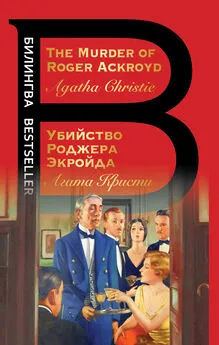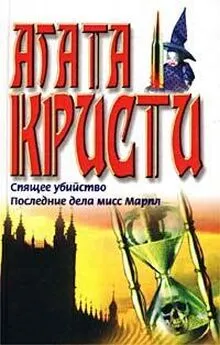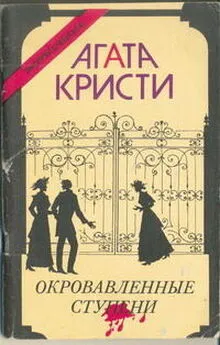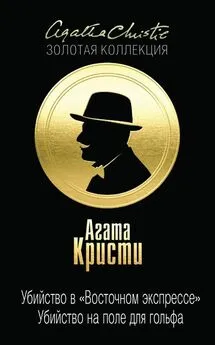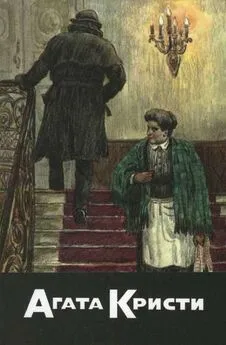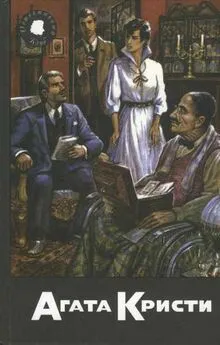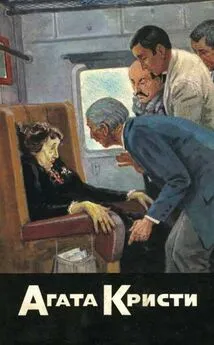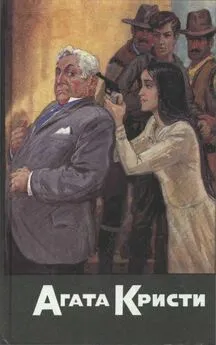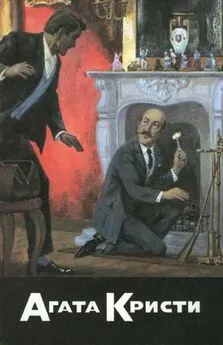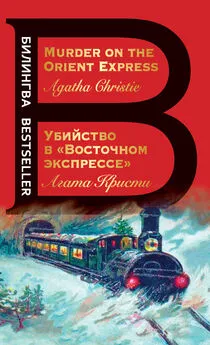Агата Кристи - The Murder of Roger Ackroyd / Убийство Роджера Экройда
- Название:The Murder of Roger Ackroyd / Убийство Роджера Экройда
- Автор:
- Жанр:
- Издательство:неизвестно
- Год:2022
- Город:Москва
- ISBN:978-5-04-166489-3
- Рейтинг:
- Избранное:Добавить в избранное
-
Отзывы:
-
Ваша оценка:
Агата Кристи - The Murder of Roger Ackroyd / Убийство Роджера Экройда краткое содержание
В формате PDF A4 сохранен издательский макет.
The Murder of Roger Ackroyd / Убийство Роджера Экройда - читать онлайн бесплатно ознакомительный отрывок
Интервал:
Закладка:
The housekeeper bade us a dry good afternoon, and we took our leave.
I left the house with Poirot.
‘I wonder,’ I said, breaking the silence, ‘what the papers the girl disarranged could have been for Ackroyd to have got into such a state about them? I wonder if there is any clue there to the mystery.’
‘The secretary said there were no papers of particular importance on the desk,’ said Poirot quietly.
‘Yes, but-’ I paused.
‘It strikes you as odd that Ackroyd should have flown into a rage about so trivial a matter?’
‘Yes, it does rather.’
‘But was it a trivial matter?’
‘Of course,’ I admitted, ‘we don’t know what those papers may have been. But Raymond certainly said-’
‘Leave M. Raymond out of it for a minute. What did you think of that girl?’
‘Which girl? The parlourmaid?’
‘Yes, the parlourmaid. Ursula Bourne.’
‘She seemed a nice girl,’ I said hesitatingly.
Poirot repeated my words, but whereas I had laid a slight stress on the fourth word, he put it on the second.
‘She seemed a nice girl – yes.’
Then, after a minute’s silence, he took something from his pocket and handed it to me.
‘See, my friend, I will show you something. Look there.’
The paper he had handed me was that compiled by the inspector and given by him to Poirot that morning. following the pointing finger, I saw a small cross marked in pencil opposite the name Ursula Bourne.
‘You may not have noticed it at the time, my good friend, but there was one person on this list whose alibi had no kind of confirmation. Ursula Bourne.’
‘You don’t think-?’
‘Dr Sheppard, I dare to think anything. Ursula Bourne may have killed Mr Ackroyd, but I confess I can see no motive for her doing so. Can you?’
He looked at me very hard – so hard that I felt uncomfortable.
‘Can you?’ he repeated.
‘No motive whatsoever,’ I said firmly.
His gaze relaxed. He frowned and murmured to himself:
‘Since the blackmailer was a man, it follows that she cannot be the blackmailer, then-’ I coughed.
‘As far as that goes-’ I began doubtfully.
He spun round on me.
‘What? What are you going to say?’
‘Nothing, Nothing. Only that, strictly speaking, Mrs Ferrars in her letter mentioned a person – she didn’t actually specify a man. But we took it for granted, Ackroyd and I, that it was a man.’
Poirot did not seem to be listening to me. He was muttering to himself again.
‘But then it is possible after all – yes, certainly it is possible – but then – ah! I must rearrange my ideas. Method, order, never have I needed them more. everything must fit in – in its appointed place – otherwise I am on the wrong track.’ He broke off, and whirled round upon me again. ‘Where is Marby?’
‘It’s on the other side of Cranchester.’
‘How far away?’
‘Oh! – fourteen miles, perhaps.’
‘Would it be possible for you to go there? Tomorrow, say?’
‘Tomorrow? Let me see, that’s Sunday. yes, I could arrange it. What do you want me to do there?’
‘See this Mrs Folliott. Find out all you can about Ursula Bourne.’
‘Very well. But – I don’t much care for the job.’
‘It is not the time to make difficulties. A man’s life may hang on this.’
‘Poor Ralph,’ I said with a sigh. ‘You believe him to be innocent, though?’
Poirot looked at me very gravely.
‘Do you want to know the truth?’
‘Of course.’
‘Then you shall have it. My friend, everything points to the assumption that he is guilty.’
‘What!’ I exclaimed.
Poirot nodded.
‘Yes, that stupid inspector – for he is stupid – has everything pointing his way. I seek for the truth – and the truth leads me every time to ralph Paton. Motive, opportunity, means. But I will leave no stone unturned. I promised Mademoiselle flora. And she was very sure, that little one. But very sure indeed.’
Chapter 11
Poirot Pays a Call
I was slightly nervous when I rang the bell at Marby Grange the following afternoon. I wondered very much what Poirot expected to find out. he had entrusted the job to me. Why? Was it because, as in the case of questioning Major Blunt, he wished to remain in the background? The wish, intelligible in the first case, seemed to me quite meaningless here.
My meditations were interrupted by the advent of a smart parlourmaid. Yes, Mrs Folliott was at home. I was ushered into a big drawing-room, and looked round me curiously as I waited for the mistress of the house. A large bare room, some good bits of old china, and some beautiful etchings, shabby covers and curtains. A lady’s room in every sense of the term.
I turned from the inspection of a Bartolozzi on the wall as Mrs folliott came into the room. She was a tall woman, with untidy brown hair, and a very winning smile.
‘Dr Sheppard,’ she said hesitatingly.
‘That is my name,’ I replied. ‘I must apologize for calling upon you like this, but I wanted some information about a parlourmaid previously employed by you, Ursula Bourne.’
‘Ursula Bourne?’ she said hesitatingly.
‘Yes,’ I said. ‘Perhaps you don’t remember the name?’
‘Oh, yes, of course. I–I remember perfectly.’
‘She left you just over a year ago, I understand?’
‘Yes. Yes, she did. That is quite right.’
‘And you were satisfied with her whilst she was with you? how long was she with you, by the way?’
‘Oh! A year or two – I can’t remember exactly how long. She – she is very capable. I’m sure you will find her quite satisfactory. I didn’t know she was leaving fernly. I hadn’t the least idea of it.’
‘Can you tell me anything about her?’ I asked.
‘Anything about her?’
‘Yes, where she comes from, who her people are – that sort of thing?’
Mrs Folliott’s face wore more than ever its frozen look.
‘I don’t know at all.’
‘Who was she with before she came to you?’
‘I’m afraid I don’t remember.’
There was a spark of anger now underlying her nervousness. She flung up her head in a gesture that was vaguely familiar.
‘Is it really necessary to ask all these questions?’
‘Not at all,’ I said, with an air of surprise and a tinge of apology in my manner. ‘I had no idea you would mind answering them. I am very sorry.’
Her anger left her and she became confused again.
‘oh! I don’t mind answering them. I assure you I don’t. Why should I? It – it just seemed a little odd, you know. That’s all. A little odd.’
One advantage of being a medical practitioner is that you can usually tell when people are lying to you. I should have known from Mrs Folliott’s manner, if from nothing else, that she did mind answering my questions – minded intensely. She was thoroughly uncomfortable and upset, and there was plainly some mystery in the background. I judged her to be a woman quite unused to deception of any kind, and consequently rendered acutely uneasy when forced to practise it. A child could have seen through her.
But it was also clear the she had no intention of telling me anything further. Whatever the mystery centring round Ursula Bourne might be, I was not going to learn it through Mrs Folliott.
Defeated, I apologized once more for disturbing her, took my hat and departed.
I went to see a couple of patients and arrived home about six o’clock. Caroline was sitting beside the wreck of tea things. She had that look of suppressed exultation on her face which I know only too well. It is a sure sign with her of either the getting or the giving of information. I wondered which it had been.
‘I’ve had a very interesting afternoon,’ began Caroline, as I dropped into my own particular easy-chair and stretched out my feet to the inviting blaze in the fireplace.
‘Have you?’ I said. ‘Miss Gannett drop in to tea?’
Miss Gannett is one of the chief of our news-mongers.
‘Guess again,’ said Caroline, with intense complacency.
I guessed several times, working slowly through all the members of Caroline’s Intelligence corps. My sister received each guess with a triumphant shake of the head. In the end she volunteered the information herself.
‘M. Poirot!’ she said. ‘Now, what do you think of that?’
I thought a good many things of it, but I was careful not to say them to Caroline.
‘Why did he come?’ I asked.
‘To see me, of course. He said that, knowing my brother so well, he hoped he might be permitted to make the acquaintance of his charming sister – your charming sister, I’ve got mixed up – but you know what I mean.’
‘What did he talk about?’ I asked.
‘He told me a lot about himself and his cases. You know that Prince Paul of Mauretania – the one who’s just married a dancer?’
‘Yes?’
‘I saw a most intriguing paragraph about her in Society Snippets the other day, hinting that she was really a russian grand duchess – one of the czar’s daughters who managed to escape from the Bolsheviks. Well, it seems that M. Poirot solved a baffling murder mystery that threatened to involve them both. Prince Paul was beside himself with gratitude.’
‘Did he give him an emerald tie pin the size of a plover’s egg?’ I inquired sarcastically.
‘He didn’t mention it. Why?’
‘Nothing,’ I said. ‘I thought it was always done. It is in detective fiction anyway. The super-detective always has his rooms littered with rubies and pearls and emeralds from grateful royal clients.’
‘It’s very interesting to hear about these things from the inside,’ said my sister complacently.
It would be – to Caroline. I could not but admire the ingenuity of M. Hercule Poirot, who had selected unerringly the case of all others that would most appeal to an elderly lady living in a small village.
‘Did he tell you if the dancer was really a grand duchess?’ I inquired.
‘He was not at liberty to speak,’ said Caroline importantly.
I wondered how far Poirot had strained the truth in talking to Caroline – probably not at all. he had conveyed his innuendoes by means of his eyebrows and his shoulders.
‘And after all this,’ I remarked, ‘I suppose you were ready to eat out of his hand?’
‘Don’t be coarse, James. I don’t know where you get these vulgar expressions from.’
‘Probably from my only link with the outside world – my patients. unfortunately, my practice does not lie amongst royal princes and interesting russian émigrés.’
Caroline pushed her spectacles up and looked at me.
‘You seem very grumpy, James. It must be your liver. A blue pill, I think, tonight.’
To see me in my own home, you would never imagine that I was a doctor of medicine. Caroline does the home prescribing both for herself and me.
‘Damn my liver,’ I said irritably. ‘Did you talk about the murder at all?’
‘Well, naturally, James. What else is there to talk about locally? I was able to set M. Poirot straight upon several points. he was very grateful to me. he said I had the makings of a born detective in me – and a wonderful psychological insight into human nature.’
Caroline was exactly like a cat that is full to over-flowing with rich cream. She was positively purring.
‘He talked a lot about the little grey cells of the brain, and of their functions. His own, he says, are of the first quality.’
‘He would say so,’ I remarked bitterly. ‘Modesty is certainly not his middle name.’
Читать дальшеИнтервал:
Закладка:
